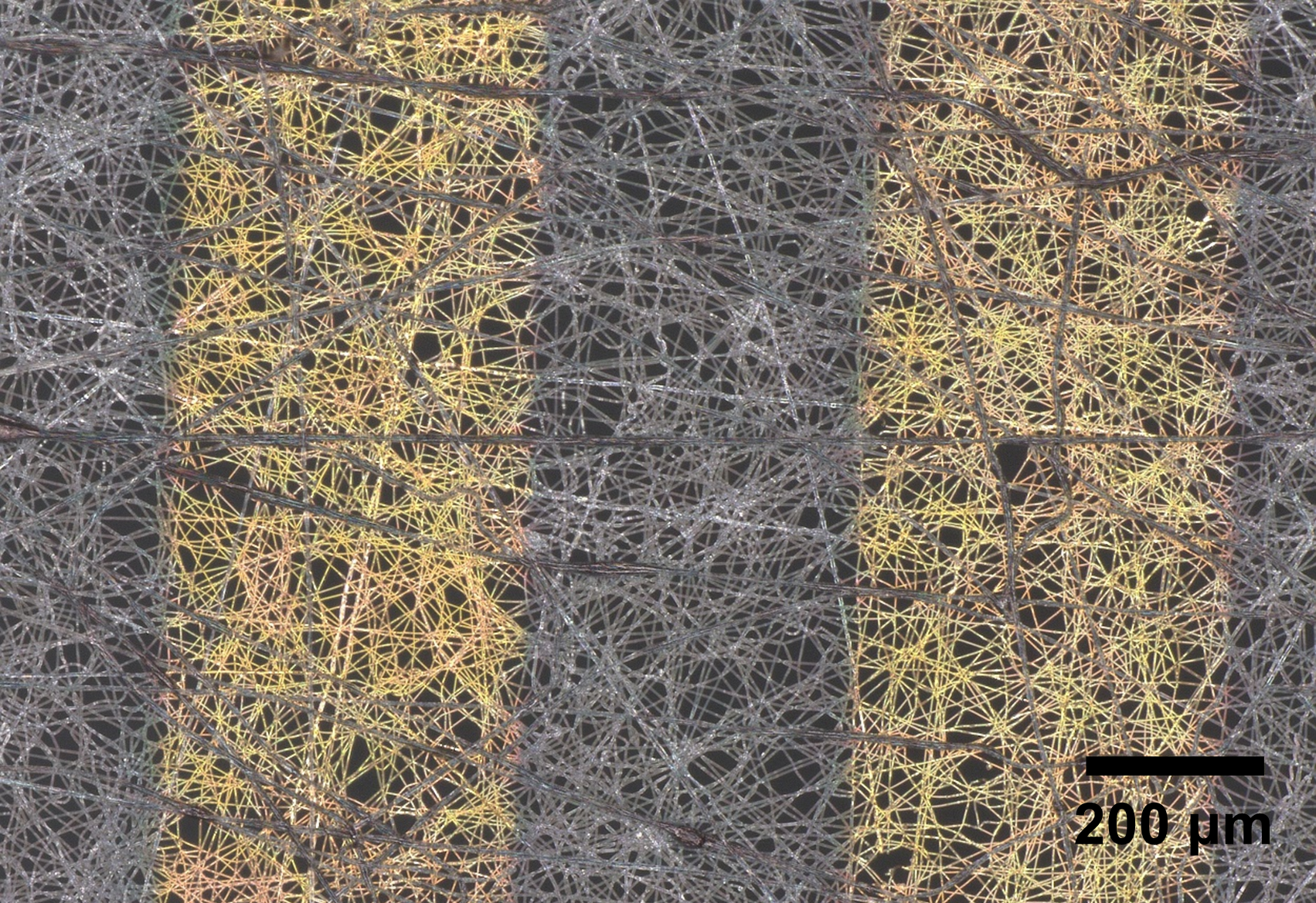Reviewed by Alex SmithOct 3 2022
On-skin wearable health devices and medical sensors are essential health care instruments that have to be extremely ultrathin and flexible to be able to move along with the human body.
 This photograph shows the structure of the ultrathin mesh-type polymer PTC thermistors used in wearable medical devices. There are many potential benefits to using mesh in this type of device. Image Credit: Chihiro Okutani, Shinshu University
This photograph shows the structure of the ultrathin mesh-type polymer PTC thermistors used in wearable medical devices. There are many potential benefits to using mesh in this type of device. Image Credit: Chihiro Okutani, Shinshu University
Furthermore, the technology has to endure stretching and bending and has to be gas-permeable to stop discomfort and irritation. Another vital safety aspect of these devices is the mandatory overheat protection circuit. This inhibits overheating of the devices and the burning of the wearer. All new technologies designed for these sensors must comply with these requirements.
In new research, scientists showed how a vital part of the sensors known as a thermistor can be built using an ultrathin fiber mesh. Thermistors are a kind of resistor whose resistance considerably differs with temperature.
The research details were published online on September 4th, 2022, in Advanced Science.
An overheat protection circuit is required to avoid burning biological tissues during the operation of flexible devices. One candidate is a polymer positive temperature coefficient (PTC) thermistor, which has a large increase in resistance within a narrow temperature range.
Chihiro Okutani, Assistant Professor, Department of Electrical and Computer Engineering, Shinshu University
“For such thermistors to be applied for on-skin medical sensors, they must be stretchable and bendable down to several hundred micrometers. However, it is still challenging to fabricate a thermistor whose temperature characteristics do not deteriorate when wrapped around a needle with a bending radius of less than 1 mm,” Okutani added.
This technology must be able to wrap around a needle because sensors, at times, are attached to catheters or needles while in use. Therefore, to accomplish this, the thermistor has to be ultrathin.
Scientists used a method known as electrospinning to develop the ultrathin mesh-type polymer PTC thermistor. Electrospinning employs electricity to form minute fibers. The fibers can be created from various materials, but in this particular scenario, scientists used a mixture of composite materials.
The newly engineered thermistor was then tested to guarantee it comprised similar performance features of prevailing technologies. Similar to standard film-type thermistors, the mesh-type polymer PTC thermistor demonstrated an increase in resistance of three orders of magnitude, a critical feature for averting overheating and burns.
By utilizing a mesh structure, the thermistor also attained transparency, enabling the sensors to blend into the skin and gas-permeability. Gas-permeability is essential because it stops discomfort and irritation.
We also demonstrated the operation of the thermistor wrapped around a 280 μm needle by fabricating the fibers on a 1.4 μm ultrathin film.
Chihiro Okutani, Assistant Professor, Department of Electrical and Computer Engineering, Shinshu University
Even though this fiber layer provided the mesh structure and extra heat sensing, the thermistor remained thin. This is crucial because all wearable medical devices have to be able to endure bending, and when the device is thinner, the strain is less.
Although this thermistor technology has substantial potential, additional research must be conducted to render this a dependable substitute for the existing commercial thermistor technology.
A mesh-type thermistor has a high preliminary resistance value because of its restricted number of conductive paths. The scientists suggested that decreasing the spacing between fibers in the mesh or expanding the number of electrodes used could resolve a few of these issues, but further testing will need to be conducted.
Our next step is practical applications of the developed thermistors. We believe that the ultraflexible and gas-permeable thermistors can act as overheat prevention components for on-skin or implantable devices, which make flexible sensors safer to operate and more reliable.
Chihiro Okutani, Assistant Professor, Department of Electrical and Computer Engineering, Shinshu University
Other study contributors include Takao Someya and Tomoyuki Yokota of the Department of Electrical Engineering and Information Systems at the University of Tokyo.
This research was supported by JST ACCEL, Tateisi Science and Technology Foundation, and the Japan Society for the Promotion of Science.
Journal Reference:
Okutani, C., et al. (2022) Ultrathin Fiber-Mesh Polymer Thermistors. Advanced Science. doi.org/10.1002/advs.202202312.